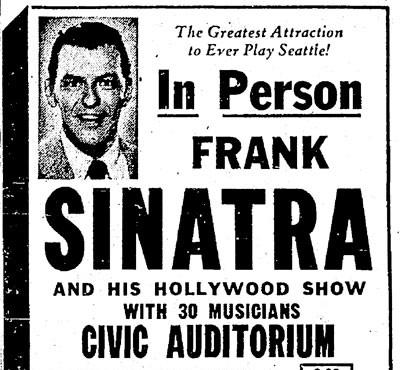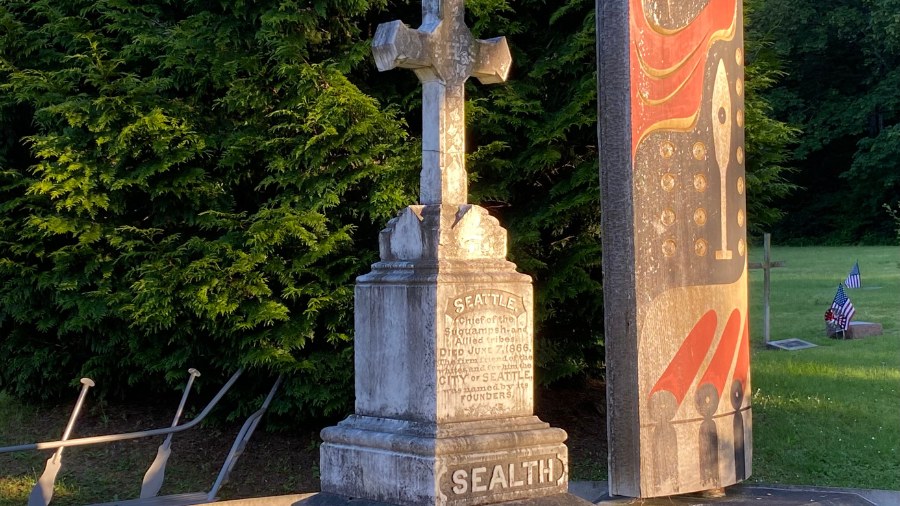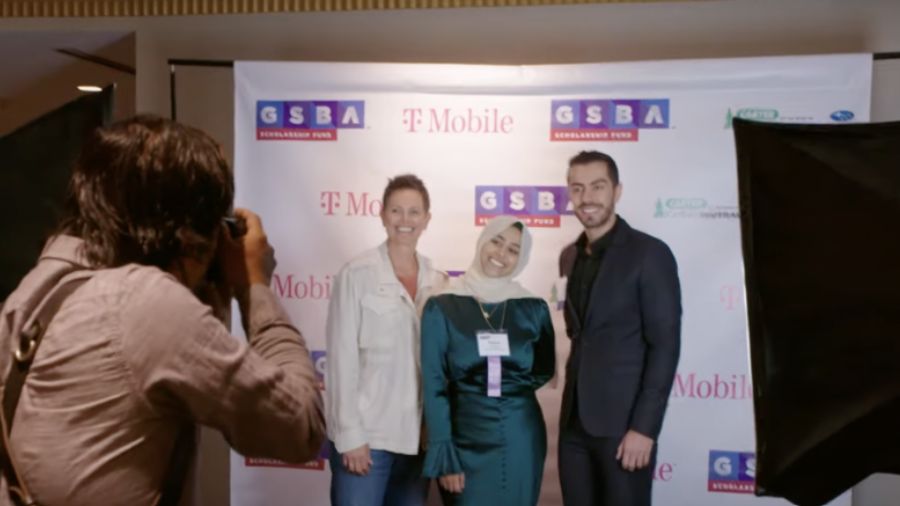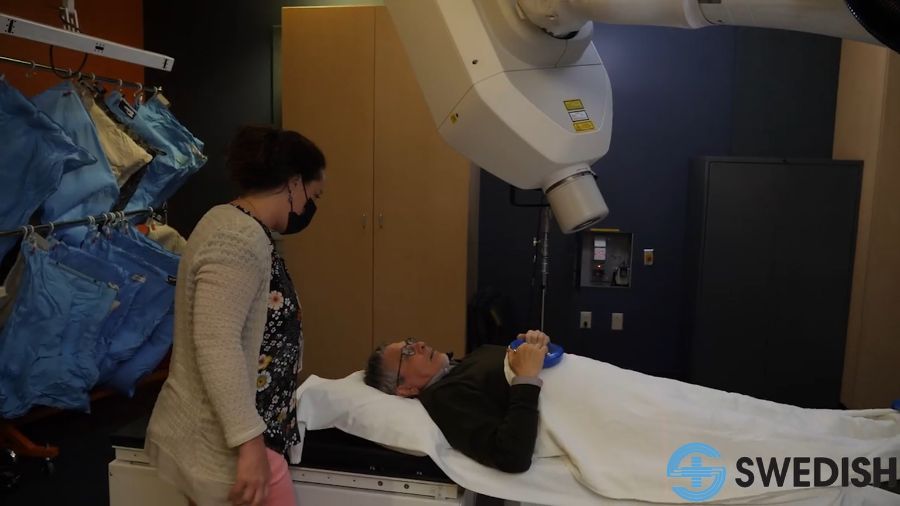Local Black history is booming in the Evergreen State
Aug 30, 2023, 11:36 AM
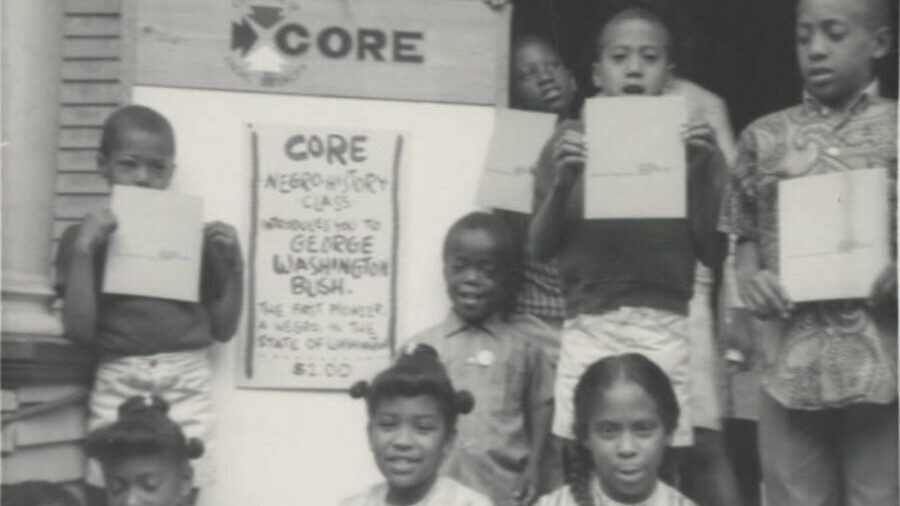
The photograph shows students in the Black History class at one of CORE's - Congress of Racial Equality - 'Freedom Schools' during the 1966 Seattle School Boycott. (Courtesy Seattle Public Library)
(Courtesy Seattle Public Library)
The 60th anniversary of Dr. Martin Luther King Jr.’s historic “I Have a Dream” speech has justifiably received a lot of local and national media attention this past week.
But closer to home, many new efforts are also underway to collect, preserve and share the Puget Sound and Washington state history related to the Civil Rights era and stories of more than a century of Black Washingtonians.
Black history, like the history of any ethnic group, has its own parameters and specific focus areas, but at its core, it’s really just local history, a collection of artifacts, documents, photos, film, places, structures and stories about how people lived.
However, in the wake of the murder of George Floyd in 2020, a new emphasis can be found in the work of some important local groups to address gaps in how the broader stories of Pacific Northwest history are collected and shared.
More from Feliks Banel: Big wrenches come out of the woodwork
The Seattle Public Library (SPL) was awarded a Digital Humanities Grant from the Washington State Library, which funded the digitization through hi-resolution scanning of 300 items or about a thousand pages of material dating from the 19th century to the 1960s.
One of the collections SPL focused on digitizing are photos and documents that belonged to LeEtta Sanders King, a trailblazing Black woman in civic organizations and business in Seattle.
One of the most striking artifacts in the collection is a letter Sanders King wrote to a soldier during the influenza pandemic of 1918, but which might sound familiar to anyone paying attention in, say, 2023.
Fortunately, for history’s sake, Jade D’Addario, digital projects librarian for SPL Special Collections, said that the 1918 letter could not be delivered because the soldier Sanders King mailed it to had likely shipped out for Europe, and so it ended up in Sanders King’s papers.
“So she says, ‘Everything in Seattle is closed up tight. No schools, churches, theaters, parties, dances or anything of that kind are allowed. Pool halls and clubs are also closed, and have been for three weeks nothing to do but work, eat and sleep,'” D’Addario read.
“So that’s familiar,” she said, given the more recent pandemic, of course.
“‘I heard this morning that Estella Jackson had the influenza and was very sick,” D’Addario continued reading from the 1918 letter. “‘Not many colored people have had it so far. Clarence Anderson was sick, but he’s all right again. The boys at Camp Lewis are not allowed to leave camp, and civilians are not permitted to visit them.'”
LeEtta Sanders King, who died in 1978 in her mid-80s, is well-known and remembered among many Black Seattleites, including Stephanie Johnson-Toliver, president of the not-for-profit Black Heritage Society of Washington State.
More from Feliks Banel: Seattle Times photographer Greg Gilbert retires after 56 years
“She was a pretty prominent figure in women’s social clubs,” Johnson-Toliver told KIRO Newsradio, describing Sanders King. “She was an advocate for giving back and community. She was an artist; she was a musician. She was a member at one time of the Black Musicians’ Union, and she was pretty instrumental in the early days of the Central Area Senior Center.”
LeEtta Sanders King lived a long life in Seattle, spanning decades in the early 20th century when Seattle’s Black population was very small. Johnson-Toliver said that her colleague Esther Mumford of the Black Heritage Society (BHS) conducted an oral history interview with Sanders King back in the 1970s.
BHS recently was awarded a grant from 4Culture to digitize a portion of their old oral history cassette tapes; so, Johnson-Toliver said, once that project happens, even more of Sanders King’s history will be accessible to historians, scholars and the general public and BHS is eager to partner with SPL to offer public programs that put the archival materials to use in exciting and informative ways.
BHS has been actively collecting and sharing Black history for nearly 50 years. In the recent past, Johnson-Toliver said, they’ve collaborated with the Washington State Historical Society on an exhibit about the Green Book, and on an app highlighting Black heritage sites in Washington. Earlier this year, BHS also helped develop a local exhibit about Seattle architect Benjamin McAdoo to complement a Smithsonian traveling show hosted by MOHAI and focused nationally on Black architects.
Another intriguing artifact that SPL recently digitized comes from the collection of Jean “Maid” Adams, a white woman active in the civil rights movement in the early 1960s in Seattle. The artifact is a poster for a watershed moment: when James Baldwin spoke in Seattle 60 years ago at what’s now the Egyptian Theatre as a fundraiser for a local group called “Congress on Racial Equality” or CORE.
As for what it meant for James Baldwin to have visited Seattle in 1963, Stephanie Johnson-Toliver said to think about that exercise where you get to invite three people, living or dead, to dine with you.
“He would definitely be Number One on my list, and I can even skip the other two people,” Johnson-Toliver said. “If I could just sit down with James Baldwin, fabulous writer, and poet with his finger on the pulse of the time, [who offered] a no-holds-barred opinion about being unapologetically black.”
Just a few years after Baldwin’s visit, and a decade before bussing began as a way to address segregation in Seattle schools in the 1970s, there was already friction present in the community in the spring of 1966.
And that, says Jade D’Addario, is where another part of SPL’s recently digitized collection originated.
D’Addario says that segregated schools had resulted from segregated neighborhoods, and there was also inequality in things like facilities maintenance and resource allocation for teachers and programs.
More from Feliks Banel: Reviving Lake Washington’s phantom shoreline
“The school board wasn’t doing anything about it,” D’Addario told KIRO Newsradio. “So the different Central Area community organizations came together and decided they were going to boycott. And one of the things that they did, so that the students who were boycotting had a place to go when they weren’t going to their schools, was they established Freedom Schools.”
Freedom Schools were short-term educational programs held at community gathering places, such as churches, and were designed to keep kids off the streets during the two-day boycott of March 31 and April 1, 1966. The SPL collection includes boycott posters as well as photos of students attending Freedom Schools.
Not many people nowadays – this radio historian included – have heard of or remember the Seattle school boycott of 1966.
Stephanie Johnson-Toliver remembers. She was there, and she said, it was life-changing.
“Initially, let me put it this way, we were all thinking, ‘yay, a day out of school,’ like a snow day or something,” Johnson-Toliver said, chuckling at the memory. “And so we get to this Freedom School, I went to Mount Zion, but there were other locations around the city, and oh, my gosh, I was learning so much about the Civil Rights Movement … and the importance of people organizing and standing up for their own civil rights.”
While SPL’s most recent digitization efforts have concluded – with the results available to search and browse online – a new project focused on Black history officially launches Wednesday in Tacoma and will be underway for the next 18 months.
The new project is called the Black Historic Sites Survey, and it’s supported by the National Park Service and the Washington Department of Archaeology and Historic Preservation (DAHP).
Tacoma, which already has city landmarks related to Black history, is the focus of this extension and deepening of a recent statewide survey of potential historic landmarks with similar backstories.
Monette Hearn, who led the statewide survey and is now leading the Tacoma project, told KIRO Newsradio just how few places listed on the National Register of Historic Properties, which is considered the most prestigious landmark designation in Washington state, are on that list because of their connection to Black history.
“Currently, as it stands right now, there are only two African American properties that are listed on the National Historic Landmark [register],” Hearn said. “And they’re in Pasco, and those two are Morningstar Missionary Baptist Church and Kurtzman Park.”
Hearn and lead project architectural historian Ellen Mirro say that they will be going deep into Tacoma history and plan to look beyond the traditional public records and documents and get out and talk with people to find overlooked potential landmarks. The same approach statewide turned up new potential landmarks in Evergreen State communities such as Roslyn, Spokane and Ritzville.
The public is invited to help by attending the kickoff of the project tonight, August 30, from 6 to 8 p.m. at the Tacoma campus of the Evergreen State College. Early results of the Tacoma survey will be shared at this year’s RevitalizeWA conference in Vancouver, Wash. in October.
Johnson-Toliver is excited and pleased that so many activities are underway to explore and elevate Black history in the Northwest.
“We’re really looking for ways to come to the library with public programming on topics like this, like with LeEtta Sanders King or with other people that we see as important or significant to the history of Seattle and King County and beyond,” Johnson-Toliver said.
More from Feliks Banel: City advice to landmarks board for Memorial Stadium is a real head-scratcher
“The public is saying we want to know more” about their local communities, Johnson-Toliver continued.
“We learned some of that national history,” she said, “but to be connected locally, I think, people are just really curious and anxious to hear more about who their neighbor was that lived down the street.”
You can hear Feliks every Wednesday and Friday morning on Seattle’s Morning News with Dave Ross and Colleen O’Brien, read more from him here, and subscribe to The Resident Historian Podcast here. If you have a story idea, please email Feliks here.



